|
 Secure Site
Secure Site
|
 |
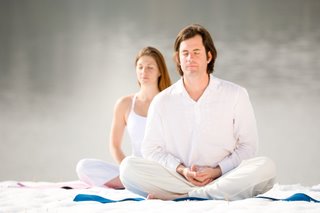 meditation calms the mindmeditation calms the mind Wave Change
Even people meditating for the first time will register a decrease in beta waves, a sign that the cortex is not processing information as actively as usual. After their first 20-minute session, patients show a marked decrease in beta-wave activity, shown in bright colors, top.
BEFORE meditation –Frontal lobe –Parietal lobe –Occipital lobe
AFTER meditation –Frontal lobe –Parietal lobe –Occipital lobe
Inside the Meditating Brain
Frontal lobe This is the most highly evolved part of the brain, responsible for reasoning, planning, emotions and self-conscious awareness. During meditation, the frontal cortex tends to go offline.
Parietal lobe This part of the brain processes sensory information about the surrounding world, orienting you in time and space. During meditation, activity in the parietal lobe slows down.
Thalamus The gatekeeper for the senses, this organ focuses your attention by funneling some sensory data deeper into the brain and stopping other signals in their tracks. Meditation reduces the flow of incoming information to a trickle.
Reticular formation As the brain’s sentry, this structure receives incoming stimuli and puts the brain on alert, ready to respond. Meditating dials back the arousal signal.
Meditation Training
 meditation training After training in meditation for eight weeks, subjects show a pronounced change in brain-wave patterns, shifting from the alpha waves of aroused, conscious thought to the theta waves that dominate the brain during periods of deep relaxation
Relaxation increases… Power of theta waves as a percentage of total EEG power –Meditation group –Control group –Sessions
…conscious thought decreases Power of alpha waves as a percentage of total EEG power –Meditation group –Control group –Sessions
Source: Dr. Gregg Jacobs, Harvard Medical School, author of The Ancestral Mind.
adapted from Time Magazine, Aug. 2003
Use our unique “Zen Clock” which functions as a Yoga Timer. It features a long-resonating acoustic chime that brings your meditation or yoga session to a gradual close, preserving the environment of stillness while also acting as an effective time signal. Our Yoga Timer & Clock can be programmed to chime at the end of the meditation or yoga session or periodically throughout the session as a kind of sonic yantra. The beauty and functionality of the Zen Clock/Timer makes it a meditation tool that can actually help you “make time” for meditation in your life. Bring yourself back to balance.
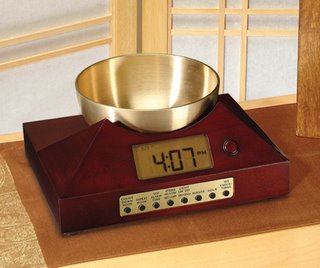 meditation timers with singing bowl chime Now & Zen’s Meditation and Yoga Timer Shop
1638 Pearl Street
Boulder, CO 80302
(800) 779-6383
Posted in Bamboo Chime Clocks, Well-being
 meditation Science has proven that meditating actually restructures your brain and can train it to concentrate, feel greater compassion, cope with stress, and more. Read the latest research and put it into practice.
Yoga citta vritti nirodhah. Yoga is the ending of disturbances of the mind. (Yoga Sutra, I.2)
Nothing is quite as satisfying as a yoga practice that’s filled with movement. Whether you prefer an intense and sweaty vinyasa practice, a gentle but deliberate Viniyoga practice, or something in between, all systems of hatha yoga provide a contented afterglow for the same reason: You sync your movement with your breath. When you do, your mind stops its obsessive churning and begins to slow down. Your attention turns from your endless to-do list toward the rhythm of your breath, and you feel more peaceful than you did before you began your practice.
For many of us, accessing that same settled, contented state is more difficult to do in meditation. It’s not easy to watch the mind reveal its worries, its self-criticism, or its old memories. Meditation requires patience and—even more challenging for most Westerners—time. So, why would you put yourself through the struggle?
Quite simply, meditation can profoundly alter your experience of life. Thousands of years ago the sage Patanjali, who compiled the Yoga Sutra, and the Buddha both promised that meditation could eliminate the suffering caused by an untamed mind. They taught their students to cultivate focused attention, compassion, and joy. And they believed that it was possible to change one’s mental powers and emotional patterns by regularly experiencing meditative states. Those are hefty promises.
But these days, you don’t have to take their word for it. Western scien-tists are testing the wisdom of the masters, using new technology that allows researchers to study how meditation in-fluences the brain.
The current findings are exciting enough to encourage even the most resistant yogis to sit down on the cushion: They suggest that meditation—even in small doses—can profoundly influence your experience of the world by remodeling the physical structure of your brain.
Our Zen Timepiece’s acoustic 6-inch brass bowl-gong clock is the world’s ultimate alarm clock, practice timer, and “mindfulness bell.”
It fills your environment with beautifully complex tones whenever it strikes. In the morning, its exquisite sounds summon your consciousness into awakening with a series of subtle gongs that provide an elegant beginning to your day. Once you experience the Zen Timepiece’s progressive awakening, you’ll never want to wake up any other way. It also serves as the perfect meditation timer.
adapted from Yoga Journal, By Kelly McGonigal
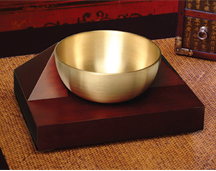 Meditation Timers with Tibetan-Singing Bowls Now & Zen
1638 Pearl Street
Boulder, CO 80302
(800) 779-6383
Posted in Bamboo Chime Clocks, Chime Alarm Clocks, intention, Meditation Timers, Meditation Tools, mindfulness practice, Now & Zen Alarm Clocks, Zen Timers
 Having a refreshed mind and body are two keys to a natural and Zen lifestyle. Do you believe you can feel better every single day—even in hard times? Dr. Andrew Weil says you can, but how will surprise you.
If you’ve ever wanted to be happier than you are, you’re obviously not alone. But Andrew Weil, MD, the founder and director of the Arizona Center for Integrative Medicine at the University of Arizona, is here to gently suggest that we might be going about it all wrong. Ever since he graduated from Harvard Medical School in 1968, Dr. Weil has been sounding the alarm about the wrongheadedness of the diagnose-and-drug model of health care. And now, with his new book, Spontaneous Happiness, he’s fixing his gaze on what makes us truly happy, what to do when we’re not, and how to better weather life’s inevitable highs and lows. He says we can all feel better—much better—than we do.
There’s an unspoken message in our society that we should all be happy all the time, and people are making themselves miserable trying to achieve it.
I don’t think that happiness or depression is a mood we should be in all or even most of the time. Most of us look for happiness “out there,” which renders it out of our control. The truth is, extremely negative and positive moods, like bliss and despondency, mark the edges of our emotional spectrum. They can help us discover a neutral midpoint of emotional health.
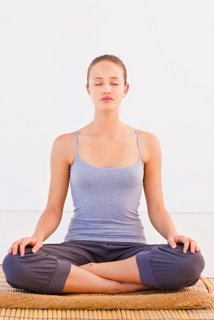 Now & Zen is focused on creating a naturalistic lifestyle, and our clocks are an example of our philosophy. And what is that midpoint exactly?
It’s contentment, which is an internal state of well-being that’s relatively impervious to life’s transient ups and downs, and it’s independent of what you have or don’t have. If you hitch your moods to something external–getting a raise, a new car, a new lover–then what happens if that goes away? Contentment, on the other hand, is an inner feeling of calm; it’s not dependent on external circumstances, possessions, or an episode of good fortune.
So how do we foster contentment?
A good place to start is with a journal where you write down what you’re grateful for and then express thanks to key people in your life. Regularly practicing this sort of thinking is one of the best strategies for enhancing a sense of well-being. You should also try some form of meditation and deep breathing–which is free, and it’s right under your nose! Breathing mindfully helps calm our nervous system—it’s an easy, powerful tool.
But let’s say you work two jobs, your parents are sick, your kids are struggling in school—how can you find time to do this?
I understand it’s difficult, but breathing exercises literally take five minutes a day; sitting down quietly and meditating on your life takes just a few minutes too.
adapted from Prevention by By Siobhan O’Connor
Use our unique “Zen Clock” which functions as a Yoga & Meditation Timer. It features a long-resonating acoustic chime that brings your meditation or yoga session to a gradual close, preserving the environment of stillness while also acting as an effective time signal. Our Yoga Timer & Clock can be programmed to chime at the end of the meditation or yoga session or periodically throughout the session as a kind of sonic yantra. The beauty and functionality of the Zen Clock/Timer makes it a meditation tool that can actually help you “make time” for meditation in your life. Bring yourself back to balance.
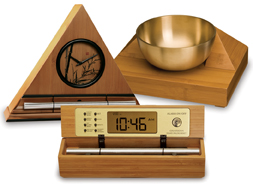 The beauty and functionality of the Zen Clock/Timer makes it a meditation tool that can actually help you "make time" for meditation in your life. Bring yourself back to balance. Now & Zen – The Yoga & Meditation Timer Store
1638 Pearl Street
Boulder, CO 80302
(800) 779-6383
orders@now-zen.com
Posted in Meditation Timers, Meditation Tools, mindfulness practice
 Wake up with gradual, beautiful acoustic chimes. The Zen Alarm Clock transforms your mornings and gets you started right, with a progressive awakening Driven to sleeplessness by the effects of stress and the demands of their own biology, women are more likely than men to have serious sleep problems, experts say.
“We see insomnia much more frequently in women, probably at least 50 percent more often than men,” said Dr. Ryan Hays, an assistant professor of neurology at the University of Texas Southwestern Medical Center in Dallas.
In response, women have turned to medication for help. In the age range most affected by insomnia, ages 40 to 59, nearly 15.5 million American women got a prescription last year to help them sleep — nearly double the rate for men in the same age group, according to IMS Health, a health-care consulting firm in Danbury, Conn.
But sleep researchers believe there’s a better way. Changes to a person’s lifestyle and to the way they approach sleep can help in a more natural and more effective way than simply popping a sleeping pill.
And putting away the pills may be especially appealing in light of a report earlier this week in the journal BMJ Open that suggested prescription sleep aids may shorten your life or increase your risk of certain cancers.
“That’s the ideal, to not rely on a pill to help you get to sleep,” said Shelby Harris, director of the behavioral sleep medicine program in the Sleep-Wake Disorders Center at Montefiore Medical Center in New York City. “It’s always best to solve a problem without a pill. It really does depend on the patient, but we prefer if you can avoid medication.”
Two major factors make women more likely than men to suffer insomnia, Harris said.
The first factor is innate and ancient. “There are a lot of hormonal and biological changes throughout the life cycle that women experience, and those affect sleep,” she said.
These hormonal changes begin with menstruation and continue through menopause. Pregnancy also can hamper sleep, particularly in the third trimester, and many women find it very difficult in the first few post-partum months to maintain a deep, healthy slumber. “Every little noise keeps you awake or wakes you up,” Harris said, tracing the phenomenon back to evolution and a hypervigilance developed by our primitive ancestors to better protect their young.
But the second factor is external and modern. Much is required of women these days, as they juggle many different life roles, and the stress this creates can make it difficult to sleep, Harris said.
 Waking up in the morning should be as pleasant as falling asleep at night. The Zen Alarm Clock's gradual, gentle awakening is transformative. “It always seems like they’re trying to fit a 30-hour day into 24 hours,” she said. “There’s little time for moms in particular to relax and unwind, to be able to go to sleep at night.”
These problems can create a vicious cycle, where a woman who has trouble sleeping will begin to fret, which makes it even more difficult to sleep, Hays said.
“Patients often feel if they don’t get a good night’s sleep, the day after is going to be the worst,” he said. “They start to learn to dread the bed.”
Hays and Harris both recommend that their patients adopt changes in their routine to help them get better sleep. These behavior modifications go beyond the usual “sleep hygiene” recommendations — like getting to bed on time every night, partaking in regular exercise or using your bed only for sleep or sex.
For example, many women with insomnia will lie in bed thinking about all the things they need to get done the next day, Harris said. She recommends that these women write up a to-do list early in the evening and then prioritize it. “Write everything out, so it’s on paper and out of your head,” she said.
Other women wake up in the middle of the night and decide to get some work done or perform some chores, which sounds like a good use of time but might be making matters worse, Harris noted.
“If you do that every night at 3:00 in the morning, you’re just training your body to get up and do work at that hour,” she said.
The two sleep experts also recommend that women get out of bed if they wake up in the middle of the night and can’t get back to sleep within a half-hour or so. But instead of working, they recommend that women do something calming, monotonous or even boring: fold clothing, or read old magazines or books in dim light.
“They’re better able to fall back asleep quicker than if they stayed in bed and became frustrated,” Hays said.
Women with extreme insomnia might even consider trying a counter-intuitive approach in which they limit their time in bed, Hays said. If they’re only getting five hours of good sleep a night, for instance, they could allow themselves only four hours in bed.
“If they spend less time in bed, there’s a better chance they’ll spend more of that time sleeping,” Hays said.
Another little sleep trick involves body temperature. Researchers have found that sleep comes with a drop in a person’s core temperature, Hays noted. Taking a relaxing warm bath before bedtime could help aid sleep. “That may increase the amount the body’s temperature actually drops, which may help sleep continuity,” he explained.
Finally, women can help themselves fall asleep by “setting the table” for sleep by adopting a routine set of relaxing rituals just before bedtime.
“A lot of people treat sleep like an on/off switch,” Harris said. “You should set aside a half-hour to treat sleep like a dimmer switch.” Sit in a favorite chair, dim the lights and do something relaxing and enjoyable.
“You’re setting the stage for sleep,” she said. “Then get in bed when you’re actually sleepy.”
Our Zen Timepiece’s acoustic 6-inch brass bowl-gong clock is the world’s ultimate alarm clock, practice timer, and “mindfulness bell.”
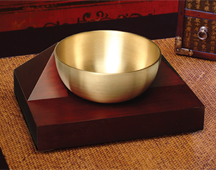 Wake up with gradual, beautiful acoustic chimes. The Zen Alarm Clock transforms your mornings and gets you started right, with a progressive awakening It fills your environment with beautifully complex tones whenever it strikes. In the morning, its exquisite sounds summon your consciousness into awakening with a series of subtle gongs that provide an elegant beginning to your day. Once you experience the Zen Timepiece’s progressive awakening, you’ll never want to wake up any other way. It also serves as the perfect meditation timer. Available in 5 wood styles, including bamboo (shown).
More information
The U.S. Centers for Disease Control and Prevention has more on sleep and sleep disorders.
 The Zen Alarm Clock transforms mornings, awakening you gradually with a series of gentle acoustic chimes Once you use a Zen Clock nothing else will do Now & Zen – The Zen Alarm Clock Store
1638 Pearl Street
Boulder, CO 80302
(800)779-6383
Orders@now-zen.com
Posted in Bamboo Chime Clocks
 Once you experience the Zen Timepiece's progressive tones, you'll never want to meditate any other way. It serves as the perfect meditation timer. It’s not what you believe in; it’s that you believe that makes a difference
Spiritual or religious beliefs can be a potent stress reducer. And it doesn’t seem to matter what you believe in, according to Dr. Esther Sternberg, director of the Integrative Neural Immune Program and chief of the Neuroendocrine Immunology and Behavior section at the National Institute of Mental Health.
God, yoga, prayer, gardening or your pet, she says an interview in the June issue of Science & Theology News, can all trigger physiological processes that de-stress you. In other words, it’s not what you believe, but that you believe in something, that positively affects your immune system and helps you get and stay well.
Sternberg says that she came to recognize the importance of beliefs when she and her mother discussed them as her mother was dying. The issue arose again when she developed arthritis following her mother’s death.
“I’ve certainly seen in the last decade a huge shift,” she said, “a sea change, where all these kinds of notions–first that stress makes you sick and more recently that believing could make you well–are accepted now that there is a biology to it.”
 The beauty and functionality of the Zen Clock/Timer makes it a meditation tool that can actually help you "make time" for meditation in your life. Bring yourself back to balance. adapted from Prevention by By Jan Eickmeier
 Use our unique "Zen Clock" which functions as a Yoga Timer. It features a long-resonating acoustic chime that brings your meditation or yoga session to a gradual close, preserving the environment of stillness while also acting as an effective time signal. Digital Zen Alarm Clock Meditation Timer
Meditation is generally an inwardly oriented, personal practice, which individuals do by themselves. Meditation may involve invoking or cultivating a feeling or internal state, such as compassion, or attending to a specific focal point. The term can refer to the state itself, as well as to practices or techniques employed to cultivate the state. There are dozens of specific styles of meditation practice; the word meditation may carry different meanings in different contexts. Meditation has been practiced since antiquity as a component of numerous religious traditions. A 2007 study by the U.S. government found that nearly 9.4% of U.S. adults (over 20 million) had practiced meditation within the past 12 months, up from 7.6% (more than 15 million people) in 2002.
Although meditation can be done in almost any context, practitioners usually employ a quiet, tranquil space, a meditation cushion or bench, and some kind of timing device to time the meditation session. Ideally, the more these accoutrements can be integrated the better. Thus, it is conducive to a satisfying meditation practice to have a timer or clock that is tranquil and beautiful. Using a kitchen timer or beeper watch is less than ideal. And it was with these considerations in mind that we designed our digital Zen Alarm Clock and practice timer. This unique “Zen Clock” features a long-resonating acoustic chime that brings the meditation session to a gradual close, preserving the environment of stillness while also acting as an effective time signal. The Digital Zen Clock can be programmed to chime at the end of the meditation session or periodically throughout the session as a kind of sonic yantra. The beauty and functionality of the Zen Clock/Timer makes it a meditation tool that can actually help you “make time” for meditation in your life.
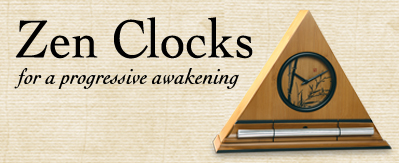 It serves as the perfect meditation timer. Available in 5 wood styles, including bamboo. Now & Zen – The Yoga & Meditation Timer Store
1638 Pearl Street
Boulder, CO 80302
(800) 779-6383
orders@now-zen.com
Posted in Meditation Timers, Meditation Tools, mindfulness practice
 The beauty and functionality of the Zen Clock/Timer makes it a meditation tool that can actually help you "make time" for meditation in your life. Calm your mind with focus and breathing
Meditation instructor Jim Malloy of St. Petersburg, FL, offers this easy-to-do meditation technique that only requires you to do it once a day for 5 minutes. (It works even better if you give it 20 minutes, twice a day.)
Find a quiet, comfortable place, where you won’t be distracted. Sit with your back straight. Place your hands in a comfortable position. If you please, you can call on God or a “higher power” to help you. Allow your eyes to rest comfortably downward, gazing softly but not focused on anything. Let your breathing become deep and rhythmic. It’s okay to let your attention drift a bit, but stay relaxed. If your eyes become heavy, let them close. Don’t worry about doing it right. You simply want to clear your head, and relax.
Use our unique “Zen Clock” which functions as a Yoga & Meditation Timer. It features a long-resonating acoustic chime that brings your meditation or yoga session to a gradual close, preserving the environment of stillness while also acting as an effective time signal. Our Yoga Timer & Clock can be programmed to chime at the end of the meditation or yoga session or periodically throughout the session as a kind of sonic yantra. The beauty and functionality of the Zen Clock/Timer makes it a meditation tool that can actually help you “make time” for meditation in your life. Bring yourself back to balance.
adapted from Prevention by By Selene Yeager
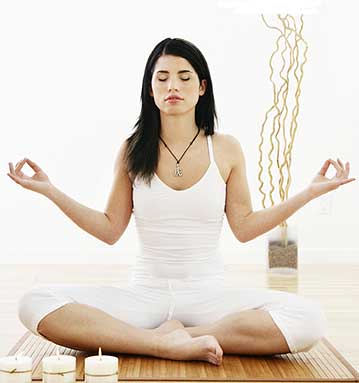 The beauty and functionality of the Zen Clock/Timer makes it a meditation tool that can actually help you "make time" for meditation in your life. 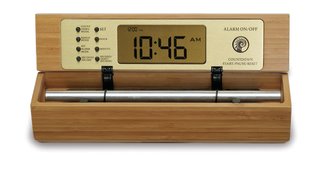 The beauty and functionality of the Zen Clock/Timer makes it a meditation tool that can actually help you "make time" for meditation in your life. Bring yourself back to balance. Now & Zen
The Yoga & Meditation Timer Shop
1638 Pearl Street
Boulder, CO 80302
(800) 779-6383
orders@now-zen.com
Posted in Bamboo Chime Clocks, Meditation Timers, Meditation Tools, mindfulness practice
 It's exquisite sounds summon your consciousness out of your meditative state with a series of subtle gongs. Once you experience the Zen Timepiece's progressive tones, you'll never want to meditate any other way. It serves as the perfect meditation timer. Kiyonaga Torii, Bonsai Vendor It’s easy to see the good in others if that’s what you decide to do
I believe that in the same way physical exercise can change your body, regular mental exercises can change how you see and engage with the world and the people you love.
Last September, I attended a meditation workshop. The meditation was this: Sit for 11 minutes with your hands in front of your heart, palms facing each other a few inches apart. We were to see the person we loved inside the space between our hands. We were to think of them happy, to see them bathed in light, to see them as their best selves. We were given a little song to sing during the meditation, but the song wasn’t the point. The point was to see the person you loved as happy for 11 minutes every day.
It was a 40-day meditation, and if you missed a day, you had to start over at day one. So every day I sat down and thought about my husband as happy. I pictured him on a boat or sleeping with our dog or laughing on the phone with his mother. We had a good marriage to start with, and now the small traces of impatience or judgment I had brought to our relationship fell away. I no longer cared if he neglected to unroll his socks before dropping them in the wash. I felt a heightened sense of joy when he came home from work. Again and again I pictured him at his best, and I responded to that best self accordingly. I remembered how grateful I was to be married to him, and then I remembered how grateful I was to even know him. The more goodness I saw in him, the more goodness he showed me. He even started going to the gym, feeling better about work, doing more to help other people. He asked me often about the meditation, and thanked me for it.
At the end of 40 days, I asked the teacher if people ever decided to push on. She told me that 40 days requested a change, 80 days formed a new pattern, and 120 days sealed your intention. I pressed ahead. It’s easy enough to find fault with people, but it’s equally easy to see their radiance if that’s what you decide to do. I didn’t change my husband, I changed myself, and in doing that I opened my eyes to what had been there all along.
Although meditation can be done in almost any context, practitioners usually employ a quiet, tranquil space, a meditation cushion or bench, and some kind of timing device to time the meditation session. Ideally, the more these accoutrements can be integrated the better. Thus, it is conducive to a satisfying meditation practice to have a timer or clock that is tranquil and beautiful. Using a kitchen timer or beeper watch is less than ideal.
 The beauty and functionality of the Zen Clock/Timer makes it a meditation tool that can actually help you "make time" for meditation in your life. Bring yourself back to balance.
And it was with these considerations in mind that we designed our digital Zen Alarm Clock and practice timer. This unique “Zen Clock” features a long-resonating acoustic chime that brings the meditation session to a gradual close, preserving the environment of stillness while also acting as an effective time signal. The Digital Zen Clock can be programmed to chime at the end of the meditation session or periodically throughout the session as a kind of sonic yantra.
adapted from Prevention by By Ann Patchett
Now & Zen – The Meditation Timer Store – Clocks & Timers with Gentle Sounds
1638 Pearl Street
Boulder, CO 80302
(800) 779-6383
orders@now-zen.com
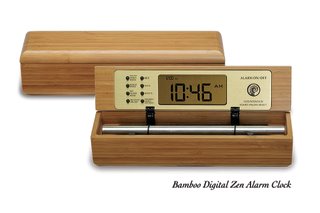 It features a long-resonating acoustic chime that brings your meditation or yoga session to a gradual close, preserving the environment of stillness while also acting as an effective time signal.
Posted in Meditation Timers, Meditation Tools, mindfulness practice
 Once you experience the Zen Timepiece's progressive tones, you'll never want to meditate any other way. It serves as the perfect meditation timer. When you focus on new details in everyday activities and encounters, you’re much more engaged, are viewed as more genuine, and, consequently, are more attractive to others. In a study by Ellen Langer, PhD, a Harvard psychologist and author of The Power of Mindful Learning, participants were asked to sell magazines either mindfully or mindlessly. Everyone memorized a sales pitch so they could recite it by rote. One group was asked to repeat the pitch verbatim with each new customer (i.e., mindlessly); the other group was told to change the script in subtle ways, such as pausing in different places (i.e., mindfully), so that only they knew how it differed each time. When the customers were asked their opinions of the salespeople, they judged the script changers (the mindful group) as more charismatic, says Langer.
A recent study from the University of North Carolina-Chapel Hill found that mindfulness techniques improve personal relationships as well. Couples who completed separate 8-week courses in traditional mindfulness-based techniques felt significantly more satisfied with their relationships than before; they also reported less stress within the relationship. These results were still in effect 3 months
later.
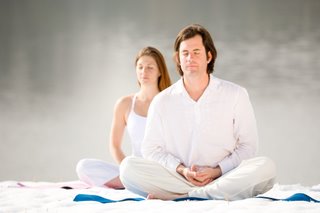 It's exquisite sounds summon your consciousness out of your meditative state with a series of subtle gongs. Try This Technique: Say Hello–Mindfully (10 minutes)
The next time you get together with good friends, make every effort to notice new details about them (what they’re wearing, the color of their eyes) and observe their physical reaction to you–and yours to them. Do you feel yourself retreating or opening toward the others? Do you sense they’re defensive, or eager to foster greater intimacy? Later, take a few moments to review what you’ve learned and how that new info has altered your perceptions of your friends.
Live in the Moment
Use our unique “Zen Clock” which functions as a Yoga & Meditation Timer. It features a long-resonating acoustic chime that brings your meditation or yoga session to a gradual close, preserving the environment of stillness while also acting as an effective time signal. Our Yoga Timer & Clock can be programmed to chime at the end of the meditation or yoga session or periodically throughout the session as a kind of sonic yantra. The beauty and functionality of the Zen Clock/Timer makes it a meditation tool that can actually help you “make time” for meditation in your life. Bring yourself back to balance.
adapted from Prevention by By Nicola Nieburg
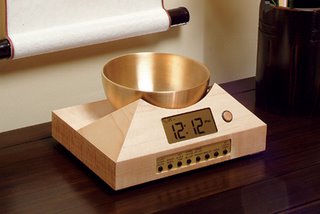 It serves as the perfect meditation timer. Available in 5 wood styles, including bamboo. Now & Zen – The Gong Meditation Timer & Clock Store
1638 Pearl Street
Boulder, CO 80302
(800) 779-6383
orders@now-zen.com
Posted in Meditation Timers, Meditation Tools, mindfulness practice
 why meditation works By MAIA SZALAVITZ
The image of the ancient but youthful-looking sage meditating on a mountaintop might be closer to reality than you think, according to a new study that found that after a three-month stay at a meditation retreat, people showed higher levels of an enzyme associated with longevity.
The study is preliminary and didn’t show that meditation actually extends life, but the findings suggest a possible means by which it could.
Researchers led by Tonya Jacobs of the University of California-Davis compared 30 participants at a meditation retreat held at the Shambhala Mountain Center in Colorado with matched controls on a waiting list for the retreat. Participants meditated six hours per day for three months. Their meditation centered on mindfulness — for instance, focusing solely on breathing, in the moment — and on lovingkindness and enhancing compassion towards others. (More on Time.com: Empathy Beats Bullies)
After the three-month intervention, researchers found that the meditators had on average about 30%* more activity of the enzyme telomerase than the controls did. Telomerase is responsible for repairing telomeres, the structures located on the ends chromosomes, which, like the plastic aglets at the tips of shoelaces, prevent the chromosome from unraveling. Each time a cell reproduces, its telomeres become shorter and less effective at protecting the chromosome — this, researchers believe, is a cause of aging. As the chromosome becomes more and more vulnerable, cell copying becomes sloppier and eventually stops when the telomeres disintegrate completely. Telomerase can mitigate — and possibly stop — cell aging.
“Something about being on a retreat for three months changed the [amount of] telomerase in the retreat group,” says Elizabeth Blackburn, a study author who has won a Nobel Prize for her previous work on telomerase. “We didn’t prove that it was meditation [that caused the change]. A lot of things happened during the retreat. But the interesting thing was that the changes we saw tracked quantifiably with the change in people’s psychological well-being and outlook.”
 meditating on a rock In other words, people with higher levels of telomerase also showed more increases in psychological improvement. In retreat participants who showed no psychological change, telomerase levels were not any higher than in controls. (Researchers were unable to compare telomerase levels in the groups both before and after the retreat for logistical reasons.)
“It’s a very good study with interesting results in terms of health implications,” says Alan Marlatt, a professor of psychology at the University of Washington who has studied meditation for decades but was not associated with this research.
Of course, the relationship between health and telomerase is complex. In a recent study in mice by Harvard researchers, they found that boosting levels of telomerase reversed signs of aging, restoring graying fur and fertility, increasing brain size and sharpening scent perception. Too much telomerase activity can also be a problem, however. A cell that reproduces endlessly sounds like a good thing at first — that cell would be immortal. But this is exactly what happens with cancer cells — infinite replication. “If telomerase levels go too far up, that’s [associated with] cancer,” says Clifford Saron, associate research scientist at the University of California-Davis Center for Mind and Brain and a co-author of the new paper. He notes, however, that the difference is one that is orders of magnitude higher—so that meditation could not possibly cause cancer*.
 Woman meditating on the beach at sunset So how does meditation affect the machinery of cellular reproduction? Probably by reducing stress, research suggests. Severe psychological stress — particularly early in life and in the absence of social support — has been linked with poorer health, increasing risk for heart disease, stroke and some cancers. This is likely due to the negative effects of high levels of stress hormones on the brain and body. By reducing stress hormones, perhaps meditation contributes to healthier telomeres.
In a study published a few years ago in Lancet Oncology, researchers compared 30 men before and after adopting lifestyle changes following a diagnosis of low-risk prostate cancer. The patients started meditating, switched to a healthy plant-based diet, exercised and attended a support group. Like the new study, the Lancet Oncologypaper found increases in telomerase linked with reduced psychological distress.
“The mind has a big influence on the body. If you get anxious, your heart beats faster and your stomach churns,” says Blackburn. “But we don’t know yet [if meditation is linked to] a reduction in stress hormones. The physiology is very complex.”
Recent evidence supports a connection: a study published this month in the Archives of General Psychiatry showed that mindfulness meditation can reduce relapse in patients who recovered from depression just as well as antidepressants.
Of course, the increases in telomerase seen in the current study could be due to some other unknown factor that separates the meditators from the controls. That’s another reason why it’s too early to suggest that stress-reducing mind-body interventions like meditation be prescribed as a treatment for any diseases or disorders. The study also did not show that meditation actually extends life, only that it may increase the activity of an enzyme that is associated with longevity.
Still, research on meditation is expanding dramatically, with studies finding it helpful for pain, depression, addiction and many other conditions. “There’s a very exciting dialogue going on,” Marlatt says of the research. “It works for many different kinds of clinical problems. It’s very promising.”
That noise you hear in the background? Millions of new meditators chanting, “Om.”
adapted from Time Magazine, Dec. 2010
Use our unique “Zen Clock” which functions as a Yoga Timer. It features a long-resonating acoustic chime that brings your meditation or yoga session to a gradual close, preserving the environment of stillness while also acting as an effective time signal. Our Yoga Timer & Clock can be programmed to chime at the end of the meditation or yoga session or periodically throughout the session as a kind of sonic yantra. The beauty and functionality of the Zen Clock/Timer makes it a meditation tool that can actually help you “make time” for meditation in your life. Bring yourself back to balance.
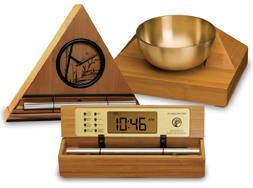 meditation timers with singing bowl chime Now & Zen’s Meditation Timer Store
1638 Pearl Street
Boulder, CO 80302
(800) 779-6383
Posted in Bamboo Chime Clocks, Chime Alarm Clocks, Now & Zen Alarm Clocks, Zen Timepiece by Now & Zen
 Perfect Gift Alarm Clock - Zen Chime Clock “The Zen Alarm Clock,” uses soothing acoustic chimes that awaken users gently and gradually, making waking up a real pleasure. Rather than an artificial recorded sound played through a speaker, the Zen Clock features an alloy chime bar similar to a wind chime. When the clock’s alarm is triggered, its chime produces a long-resonating, beautiful acoustic tone reminiscent of a temple gong. Then, as the ring tone gradually fades away, the clock remains silent until it automatically strikes again three minutes later. The frequency of the chime strikes gradually increase over ten-minutes, eventually striking every five seconds, so they are guaranteed to wake up even the heaviest sleeper. This if the perfect gift for those who are hard to find presents for…
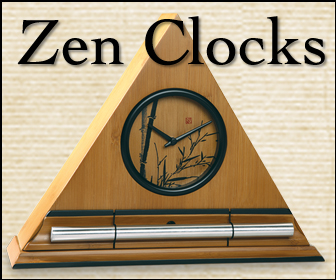 Perfect Gift Alarm Clock - Makes Waking a Soothing Experience Now & Zen Headquarter Store
1638 Pearl Steet
Boulder, CO 80302
(800) 779-6383
Posted in Chime Alarm Clocks, sleep, Well-being
|
|
|
|